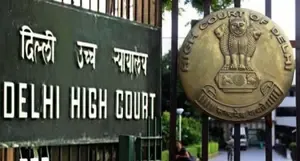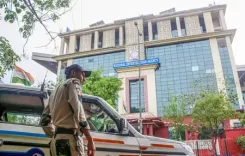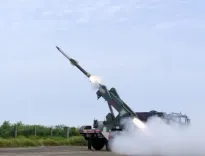Has the Delhi HC taken a stand against petrol pump owners over fuel bans for EoL vehicles?

Synopsis
Key Takeaways
- The Delhi HC is reviewing a plea from petrol pump owners.
- New rules penalize stations for refueling old vehicles.
- Authorities aim to improve air quality in Delhi.
- ANPR technology is being utilized for vehicle identification.
- Heavy fines are imposed on owners of EoL vehicles.
New Delhi, July 3 (NationPress) The Delhi High Court has decided to review a petition challenging the city government's policy that penalizes and prosecutes petrol pump owners for refueling ‘end-of-life’ (EoL) vehicles—specifically, petrol vehicles older than 15 years and diesel vehicles over 10 years. A bench led by Justice Mini Pushkarna issued a notice and requested responses from both the Delhi government and the Commission for Air Quality Management (CAQM) regarding the plea filed by the Delhi Petrol Dealers Association.
According to the petition, the “arbitrary” and “irrational” Standard Operating Procedure (SOP) imposed by the city government has placed an undue burden on petrol pump owners and their staff, compelling them to enforce the Motor Vehicles Act without being duly equipped or authorized to take on such a responsibility.
The next hearing for this plea is scheduled for September 8.
In an effort to curb emissions and enhance air quality in the national capital, often ranked among the world's most polluted cities, the Delhi government has initiated stringent regulations concerning EoL vehicles.
Per directives from the CAQM, all petrol stations within the National Capital Territory (NCT) are required to deny fuel to older vehicles identified via AI-powered Automatic Number Plate Recognition (ANPR) systems.
These AI-enabled cameras, installed at petrol stations, will automatically detect outdated vehicles using their number plates. Once identified, these vehicles will be flagged in the system to restrict fuel dispensing.
Currently, 498 fuel stations have been outfitted with ANPR cameras to facilitate real-time identification. Not only are EoL vehicles prohibited from refueling at petrol or diesel stations, but they also face significant fines if found in public areas.
Owners of four-wheelers that violate this regulation will incur a fine of Rs 10,000, while two-wheeler owners will face a penalty of Rs 5,000.
Additionally, authorities have revealed that EoL vehicles discovered parked in public spaces or near fuel stations will be confiscated and have advised vehicle owners to check their registration status to avoid penalties and seizure.
This crackdown follows alarming findings from the Centre for Science and Environment (CSE), which revealed in November 2024 that vehicles account for 51 percent of pollution from local emission sources in Delhi, making them the leading contributor to air pollution in the city.
The petition calls for the Delhi High Court to annul the city government's policy to the extent that it seeks to penalize and prosecute fuel station owners under Section 192 of the Motor Vehicles Act, 1988.






